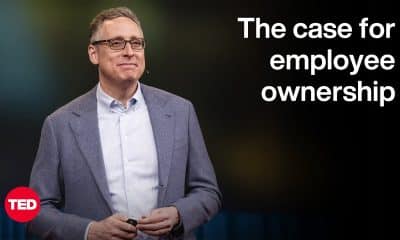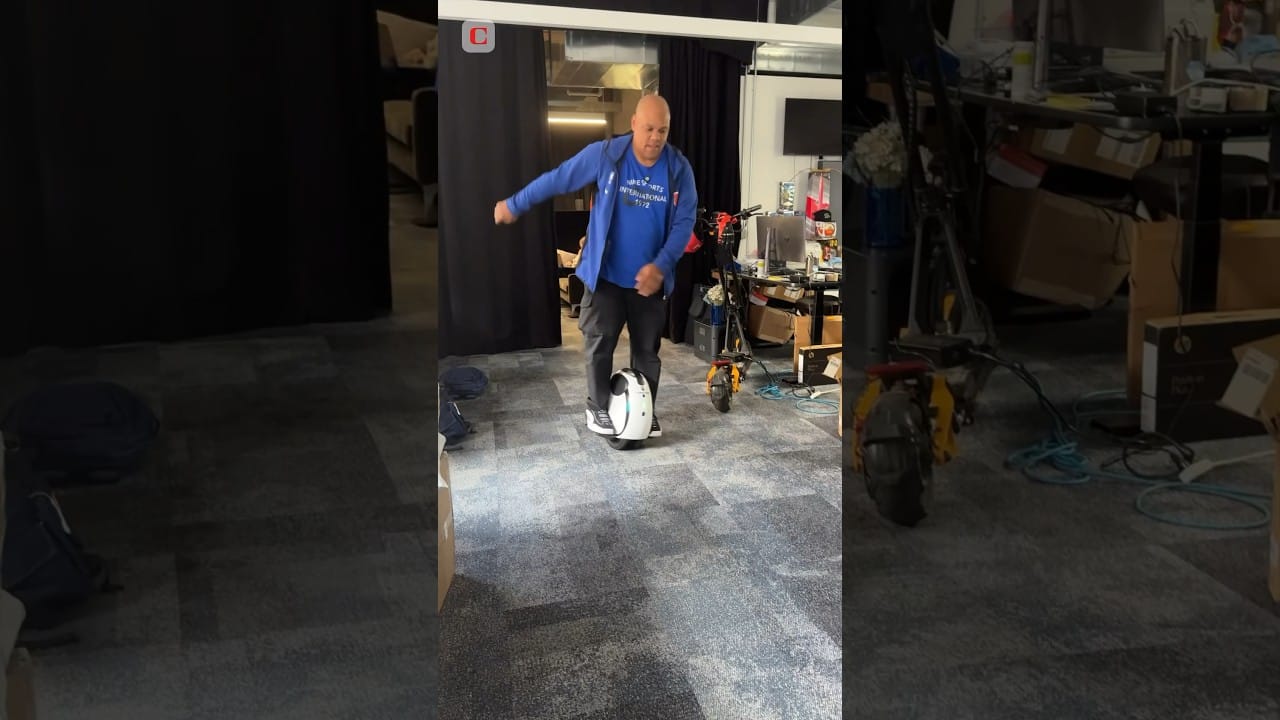It’s tempting to focus on averages when we think about data, but the world is a lot messier than those numbers can make it out to be. So what could we gain if we shifted our attention to the outliers in the data, or as data journalist Mona Chalabi likes to call them, the lost birds? Want to hear more from Mona? Check out her podcast Am I Normal? with Mona Chalabi, from the TED Audio Collective.
Want to hear more from Mona? Follow Am I Normal? on Apple Podcasts:
Visit to get our entire library of TED Talks, transcripts, translations, personalized talk recommendations and more.
The TED Talks channel features the best talks and performances from the TED Conference, where the world’s leading thinkers and doers give the talk of their lives in 18 minutes (or less). Look for talks on Technology, Entertainment and Design — plus science, business, global issues, the arts and more. You’re welcome to link to or embed these videos, forward them to others and share these ideas with people you know.
Become a TED Member:
Follow TED on Twitter:
Like TED on Facebook:
Subscribe to our channel:
TED’s videos may be used for non-commercial purposes under a Creative Commons License, Attribution–Non Commercial–No Derivatives (or the CC BY – NC – ND 4.0 International) and in accordance with our TED Talks Usage Policy (). For more information on using TED for commercial purposes (e.g. employee learning, in a film or online course), please submit a Media Request at
Transcriber:
When we think about data,
we usually think about averages.
Average height, average salary,
average number of hours
spent on video calls.
It’s tempting to focus on these neat
little summaries of our world.
But the world is a lot messier
than these averages can make it out to be.
So instead, I look for the outliers.
They can offer a better reflection
of this chaos we call life.
And they can offer a different perspective
on the things that we think we understand.
[Am I Normal? with Mona Chalabi]
Take, for instance, the stats
around teens and cigarettes.
According to the CDC,
between 1997 and 2019,
the percentage of American
high school students who smoked plummeted
from 36 to just six percent.
That seems like a pretty big win,
but when you break apart the data
and look at the outliers,
it is a totally different picture.
Among American Indian
and native Alaskan students,
cigarette usage is much higher
than that six percent average.
It comes in at a sizable 21 percent.
All other racial and ethnic groups
were in the single digits.
So what first seemed
like this great success story
is actually an indicator
of how much work we need to do
to reach some of the most
marginalized communities.
In general, when we present
data as a scatterplot,
the average would usually look like this.
And where there are outliers,
the typical approach
is to undervalue them,
to see them as a deviation
from the average
or from what society thinks is normal.
But I like to call
these outliers “lost birds.”
It’s a nickname I use for something
or someone who has gone astray.
If you look hard enough,
you’ll find that these lost birds
pop up everywhere.
Like my mom, for example.
She doesn’t like being on camera,
so this puppet will have to do.
She’s a soft spoken, hijabi woman
who isn’t much bigger than this puppet.
Because of that, it’s easy for some people
to underestimate her.
But don’t let those first
impressions fool you.
“In my generation,
we used to listen
and accept what they tell us.
‘Do what you’re told.’
But when I got older,
I just changed and I started to argue
my point and get what I want.”
My mom’s a retired doctor,
an avid ugly-dress maker,
a mother of two and a grandmother of none.
Though she spends a fair amount of time
trying to speak that into existence,
“I think for every mother,
for her daughter, she wants a grandchild.”
(Laughter)
“Sorry, Mona.”
Moving on.
My mom is also a lost bird.
“Me?”
She has, statistically
speaking, gone astray.
“Yeah, but it was a good deviation.”
Back in the late ’70s,
my mom left Iraq and moved to the UK
to further her medical
training and practice.
She’s among the four percent of people
born in Iraq who now live abroad.
By the early 2000s,
just three percent of UK doctors
with her experience
were non-white and practicing
in her speciality.
My mom is a lost bird
because she is an outlier.
She’s one of the rare few
to leave her home country
and even rarer still
among her medical peers.
We all think that the people
that we love are special,
and there is some truth to that.
But it’s worth considering the ways
that we are all lost birds.
Because when we focus on the average
and we ignore the outliers,
we lose all of the richness and insights
that those stories provide.
But when we dig into the deviations,
we get to see the bigger picture.
One from a bird’s-eye view.

 Science & Technology4 years ago
Science & Technology4 years ago
 Wired5 years ago
Wired5 years ago
 CNET4 years ago
CNET4 years ago
 Wired5 years ago
Wired5 years ago
 Wired5 years ago
Wired5 years ago
 Wired5 years ago
Wired5 years ago
 People & Blogs2 years ago
People & Blogs2 years ago
 Wired5 years ago
Wired5 years ago

















TED
November 2, 2021 at 3:05 pm
Watch more episodes of Am I Normal? with Mona Chalabi here:
IELTS SPEAKING BAND 9
November 2, 2021 at 3:10 pm
nice thank you
IELTS BAND 9 OVERAL
November 2, 2021 at 3:10 pm
nice thank you
Artemius
November 2, 2021 at 7:59 pm
I really like videos with this lady, she brings up interesting topics.
sacredweeds
November 2, 2021 at 4:15 pm
Not all who wander are lost ~ The riddle of the strider ~ JRR Tolkien
GOBSTOPPA
November 2, 2021 at 4:30 pm
MORE CODSWHALLOP FOR THE TRASH BIN.
Rushikesh Kale
November 2, 2021 at 4:32 pm
Outliners-lost birds are underestimated.
Life Is My Opportunity☀️
November 2, 2021 at 4:35 pm
Most people are other people.
Their thoughts are someone else’s opinions, their lives a mimicry, their passions a quotation.
Oscar Wilde. 🎭
tartas1995
November 2, 2021 at 4:47 pm
The smoking point is kinda weird. like sure, there is another problem and that has to be fixed but like from 46% (total average) to 21%(“worst” subset) is still amazing. The problem is not looking at averages but thinking that it tells the whole story. funny enough the 21% is still an average.
Manny Synth
November 2, 2021 at 6:52 pm
True that! She lost me at the smoking point too
Home Wall
November 2, 2021 at 4:47 pm
So she wants all to be just average, claiming that deviation from the average is bad versus where all the good innovation comes from.
Manuel Norbertson
November 2, 2021 at 4:48 pm
The fact that teens are smoking less still remains true and good and you can’t tell me otherwise.
Fernando Gil
November 2, 2021 at 5:16 pm
Missing the point. You can’t see the whole picture looking just at statistics and averages. While it may be true that an average of teens is smoking less, it tells nothing about those who don’t belong in that average. It tells nothing about those who smoke a LOT more, or those who smoke nothing at all, for instance. Furthermore, you cannot tell just by looking at this statistic whether or not those teens have moved from an unealthy habit to a healthy habit, or just replaced an unhealthy habit with another. Looking at the amount of teens and even children who have their noses glued to smartphone screens all the time, I’d wager it’s the latter.
Paul Keefer
November 2, 2021 at 5:17 pm
The puppet alternative is perhaps the best solution for those unwilling to appear on camera.
Mr Gzwx
November 2, 2021 at 5:20 pm
I understand the point, but you are mixing two ways of research up. One is the macro-level. This is the big statistical data numbers you talked about where averages come into play. The other is the micro-level where individual stories are the main focus. These two categories are completely different and the conclusions of the scientist who are conducting both research catagories are vastly different. You cant compare apples (big data research) with oranges (personal, individual, micro level research). Both have their pros and cons, so I agree with you on the need to focus on the outliers as well as the “bigger picture”.
Lucas Standing
November 2, 2021 at 9:32 pm
I wholeheartedly agree but I think this video gets at how microanalyses are often undervalued and overlooked by the public mainstream in favour of macrostatistics.
Anti-vaccine sentiment for example often draws upon the <2% death rate statistic while ignoring the microstatistics in vulnerable populations.
In the sciences academics understand this as a given, but the public often prefers to rely on heuristics such as using these "umbrella" statistics instead of interrogating the question further
Both interpretations are equally valid as long as they are being considered in conjunction with the other when necessary!
Vodis
November 3, 2021 at 1:17 am
I really feel like this video had a good and important point to make and pretty much did a faceplant when it came to delivering that point. Like, “teens are smoking less than before but some are smoking more than others and also my mother’s a camera-adverse doctor of Iraqi descent”… what? How does any of that convey the pitfalls of superficial data analysis?
I mean, the video’s 3 minutes, so I’m not expecting an in-depth breakdown of frequentist vs. bayesian methodology here. But give me some legitimately surprising outlier stats, or a point about means vs. medians, or one’s of those Simpson’s paradox deals where batting averages get switched around, anything that will make me think “hey, maybe I need to consider the broader context of this stat” the next time I hear someone rattle off an average.
Hanz Learning Solutions
November 2, 2021 at 5:36 pm
Very interesting take on the aspects. I think data has be analysed on different parameters. Generalization is the biggest problem in todays world – it makes it seems that its normal. It is the biggest problem.
ltrillx l
November 2, 2021 at 5:41 pm
🌚
🎯Motivation Bay Channel
November 2, 2021 at 5:48 pm
Great things are not accomplished by those who yield to trends and fads and popular opinion. —JACK KEROUAC
Fco G
November 2, 2021 at 6:38 pm
The content has actually some value, but the format is quite silly, it kind of resembles a youtuber channel… to personal.
Rolls Royce
November 2, 2021 at 6:39 pm
Awesome….yes…peace
JustsomeSteve
November 2, 2021 at 8:03 pm
Thanks Captain Obvious!
THE SOPHIST QUOTES
November 2, 2021 at 8:24 pm
👋Four things for success: work and pray, think and believe.
Norman Vincent Peale
Overonator
November 2, 2021 at 8:26 pm
Median is better than average a lot of the time.
K2o
November 2, 2021 at 9:30 pm
There’s so many opportunities and experiences in the world we have to take the average. No time to investigate the oddities in life, unless of course that topic resonates with you.
myparcel tape
November 2, 2021 at 9:48 pm
If Outlier then Why ?
lestrange
November 2, 2021 at 10:05 pm
I like the overall idea to focus more on deviations but I don’t know if I like the term “lost birds” because it subtly implies that they should be helped to merge with the flock or somehow brought more into line with averageness. Sometimes the outliers are the leading edge of a positive movement, like in 10 or 20 years, where they are will become the new average. If non-smokers were the outliers in the 1960’s, should they have been persuaded or guided or even manipulated or forced into joining the flock of smokers? The birds flying solo aren’t always lost, sometimes they are scouts or vanguards.
In any bell curve (lets say school test scores) there are the long tails of above average and below average. Certainly the below average might need extra help to reach functionality and proficiency. But for the above average, the goal shouldn’t be to move them backwards toward the majority. And in some situations, knowing which of the ‘long tails’ is the one that needs more help to join the flock, or which is actually fine and does not need any meddling but mostly just needs tolerance and understanding of their differentness , is not always as obvious as the test score scenario.
Steve Deasy
November 2, 2021 at 10:49 pm
“Lost Birds” – Terrible label and characterization. Won’t be watching you again because you are not rigorous in your thinking and use of language.
Ivan Leon
November 2, 2021 at 11:16 pm
lost me with the lost birds, lol.
Lucius Pertis
November 3, 2021 at 12:01 am
to be honest, i don’t think she made a clear conclusive point …. i didn’t get this
niccolom
November 3, 2021 at 12:52 am
The average people, you can make money from them by standardizing, thus saving on costs.
The abnormal people, “lost birds” as you call them, you can make money off them by customizing and providing services.
Heri Styono
November 3, 2021 at 3:57 am
With all due respect, I can, technically, give your mother grandchildren.
xandercorp
November 3, 2021 at 8:03 am
Why not treat data like an actually competent scientist and look at the fat of the matter, morphology of the distribution? You’re just emphasizing one blind spot over another.
Shaka
November 3, 2021 at 10:50 am
She had me at puppet mom.
Discover with Twins
November 3, 2021 at 11:05 am
Great
Eli Nope
November 3, 2021 at 12:39 pm
All of the girls I have fallen in love with were outliers. The norm is undesirable.
ibrahim emad
November 3, 2021 at 1:05 pm
Interesting. Love from iraq
Paper Tiger
November 3, 2021 at 2:13 pm
useless
jak234
November 3, 2021 at 2:15 pm
Yes, but average represents big chunk which has economic of scale when we are marketing a product to
أقرأ لك iqraa4u
November 3, 2021 at 2:34 pm
Great talk , thank you,
And I hope your amazing mother get to have grandchildren
James Ray
November 3, 2021 at 3:46 pm
I would imagine that the Indian community had much high smoking %s than the aforementioned 36% in the decades past, which means the win is likely still large.
Sarah Bears
November 3, 2021 at 3:56 pm
O my word, i so wish we could see more pics of your mums dresses xD that is too funny.
0 0
November 3, 2021 at 4:47 pm
Not good. Biased
Рамазан Баккунов
November 3, 2021 at 6:08 pm
one can feel that unconditional love of that girl to her mother when her voice trembles a little bit in the end))
Owen English
November 3, 2021 at 11:45 pm
gay
Miguel Suarez-solis
November 4, 2021 at 1:54 am
Ah yes look at averages within averages… Derp
Mikail Lale
November 4, 2021 at 7:21 pm
Why you use the muslim woman appearence in your video. This is so false character. You shouldn’t use the muslim features like hijab on the toys.
Fong Man
November 5, 2021 at 7:27 am
Alternatively, we all think we are special and are outliers.
But believe it or not, we are more average to other human beings than we think we are.
WebsterHelios
November 5, 2021 at 8:37 pm
Being normal is boring.
Lambro
November 7, 2021 at 7:24 am
I’m in the middle of a statistics college course and we just went over how to calculate a regression line within a scatterplot, then low and behold I randomly watch this video that just so happens to be all about statistics and everything I’ve been learning. Pretty cool.
Ari Mahendra
November 7, 2021 at 10:09 am
my lecturer always told me, when there is an outliers, simply ignore it😂
dachr2
November 7, 2021 at 9:27 pm
I’d love to hear more about this. It’s a fascinating topic!
I’ve seen another talk about body statistics where they explained that you only need a handful of parameters before it becomes impossible to actually find someone that matches the average of said parameters.
Matt English
November 7, 2021 at 10:25 pm
Her thesis is juvenile. She claims that “instead, I look for the outliers”. INSTEAD? Silly. The obvious answer is to INCLUDE outliers in an assessment, but still keep the average or median as a primary issue. What is the threshold for being accepted as a TED speaker???
DJBnw
November 8, 2021 at 4:41 pm
May i introduce “median”